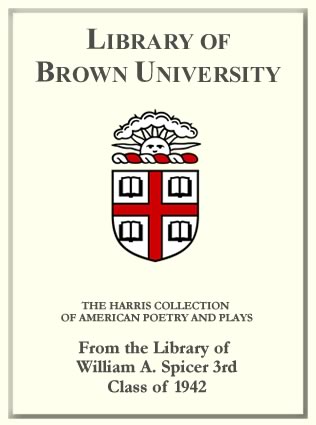Browse honoree bookplates
William A. Spicer 3rd, Class of 1942, to the Harris Collection

William Arnold Spicer III (1942) was born and raised in Providence and, like his father William A. Spicer, Jr. (1905), graduated from Brown. During World War II, Bill served under Gen. George S. Patton as a U.S. Army guide and French interpreter, taking part in Operation Torch in North Africa. After the war, he worked for the St. Regis Paper Company in East Providence, Rhode Island; for Brown and Sharpe Company in Chicago; and for B.I.F. Industries in Providence before joining the Division of Engineering at Brown, where he served as an administrator for ten years. At the Rhode Island School of Design (RISD), he served in administration under President Lee Hall for two years. Bill Spicer was a man with a myriad of interests. He had an abiding interest in the care and restoration of antique clocks that he turned into a business during his retirement years. Known around town as The Clock Guy, he cared for vintage clocks belonging to nearly every local institution, from Brown to the RISD Museum, the Rhode Island Historical Society, the First Unitarian Church on Benefit Street, and the Herreshoff Marine Museum in Bristol. He was something of a fixture at the John Hay Library, where he wound and cared for the Library's numerous clocks. He was also an accomplished genealogist who traced his family roots back to the Mayflower and to Deacon Edward Taylor of Providence, an early Congregational leader. Bill belonged to a number of clubs and organizations, including the National Association of Watch and Clock Collectors, the Providence Art Club, the Brown Faculty Club, the Handicraft Club, the Providence Athenaeum, the Agawam Hunt Club of Rhode Island and the Beneficent Congregational Church. His library was donated to Brown by his niece, Marcy Snapp, and nephew, Ben Snapp.
See items in honor of William A. Spicer 3rd, Class of 1942, to the Harris Collection
